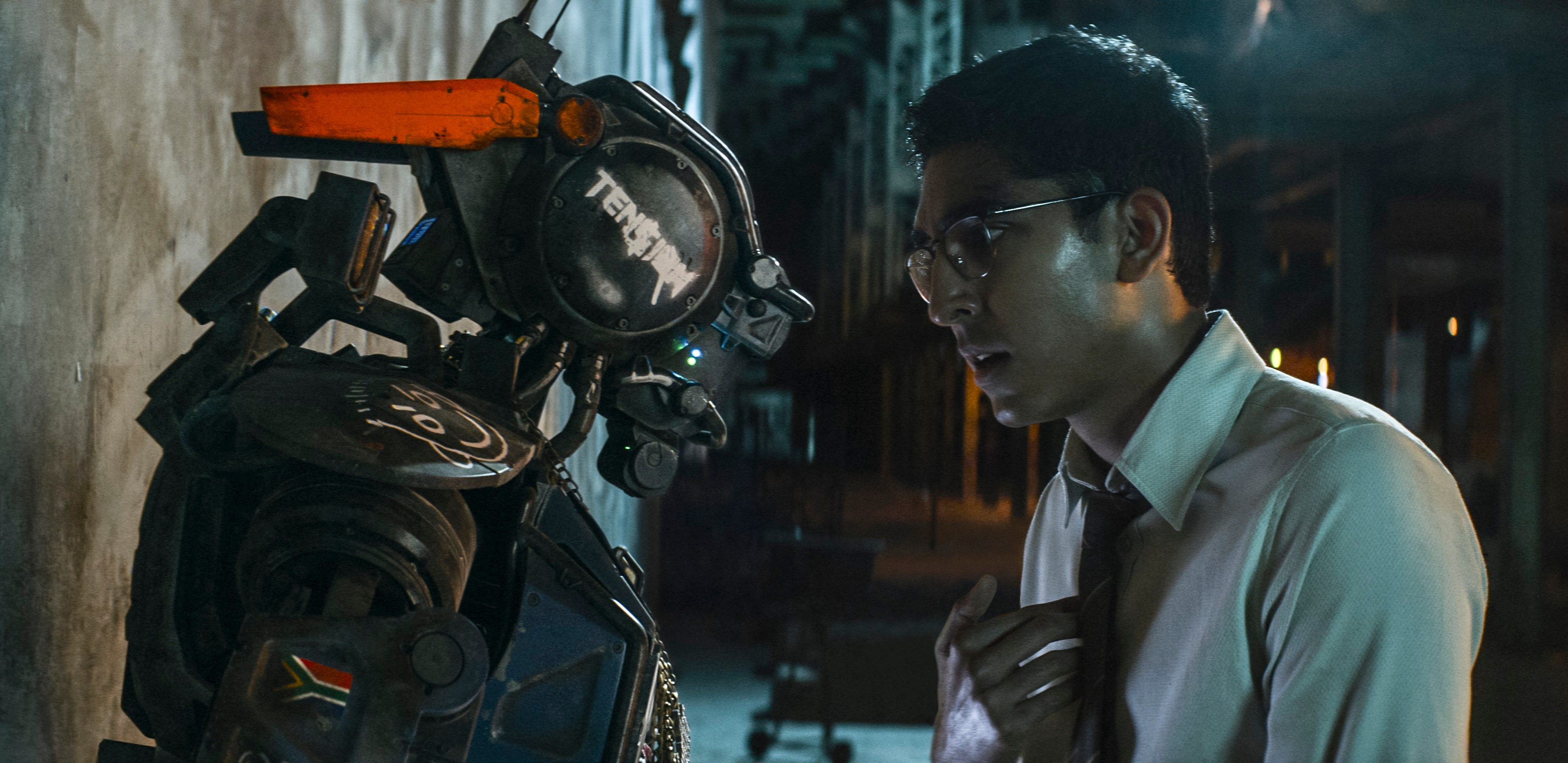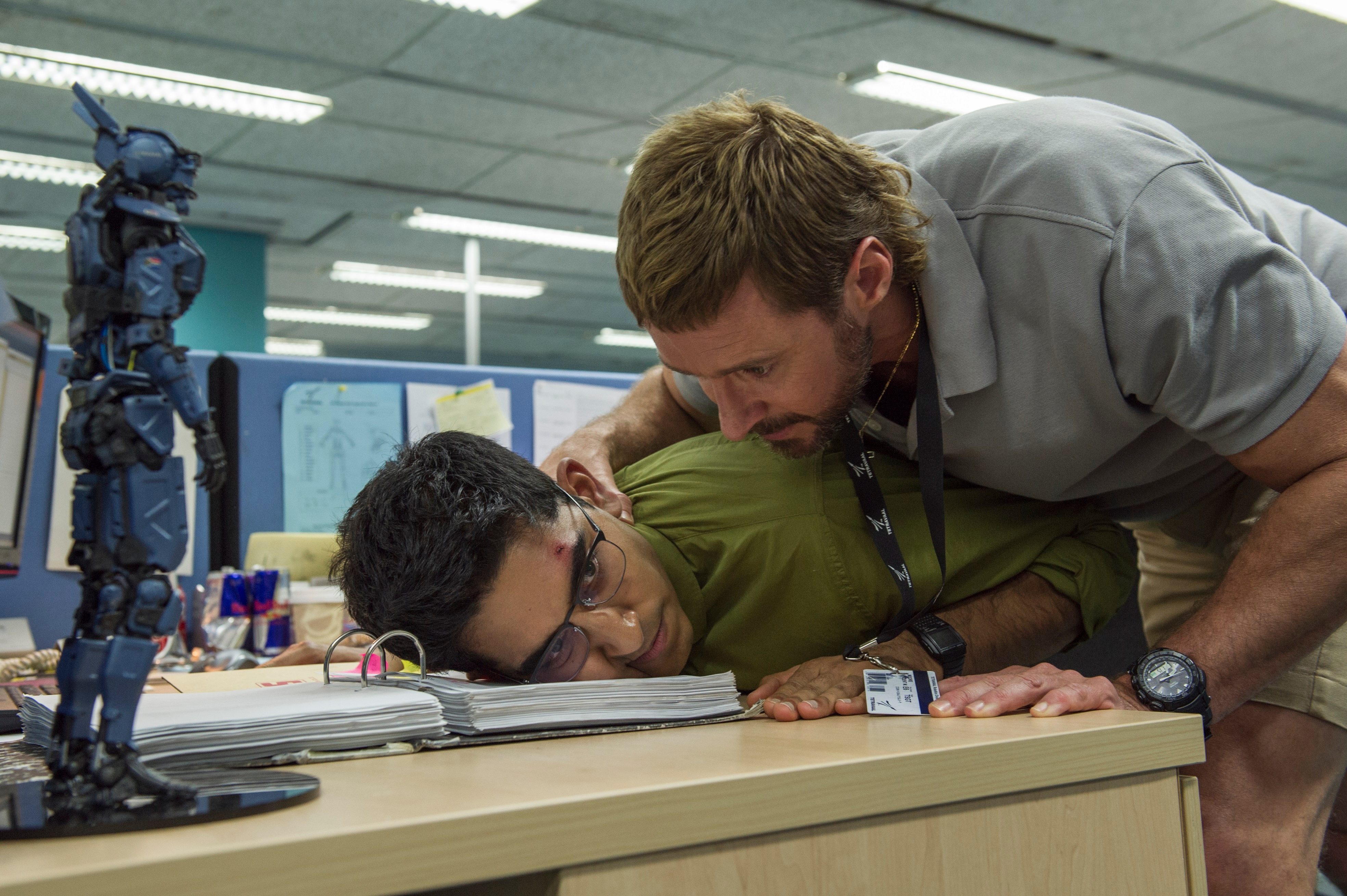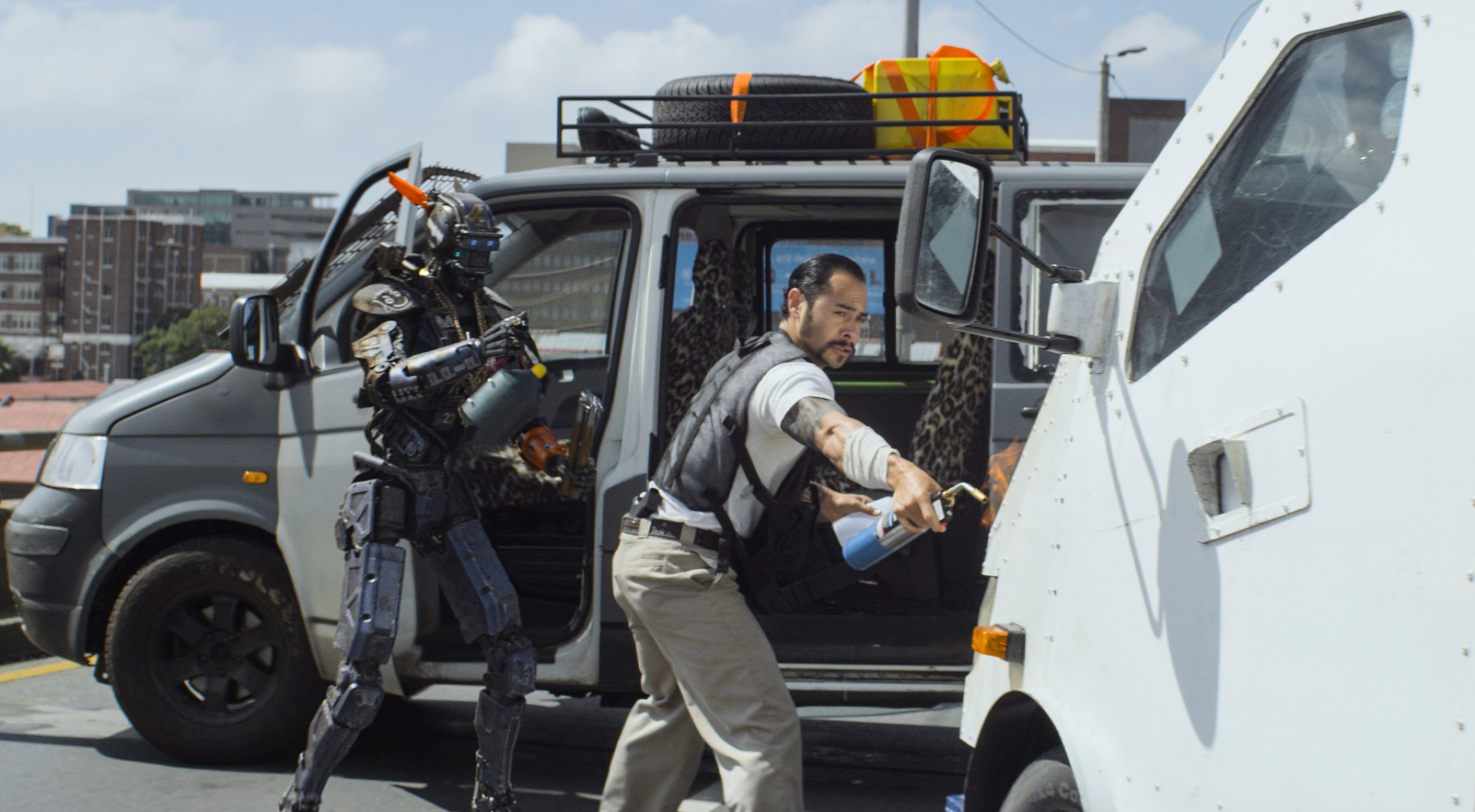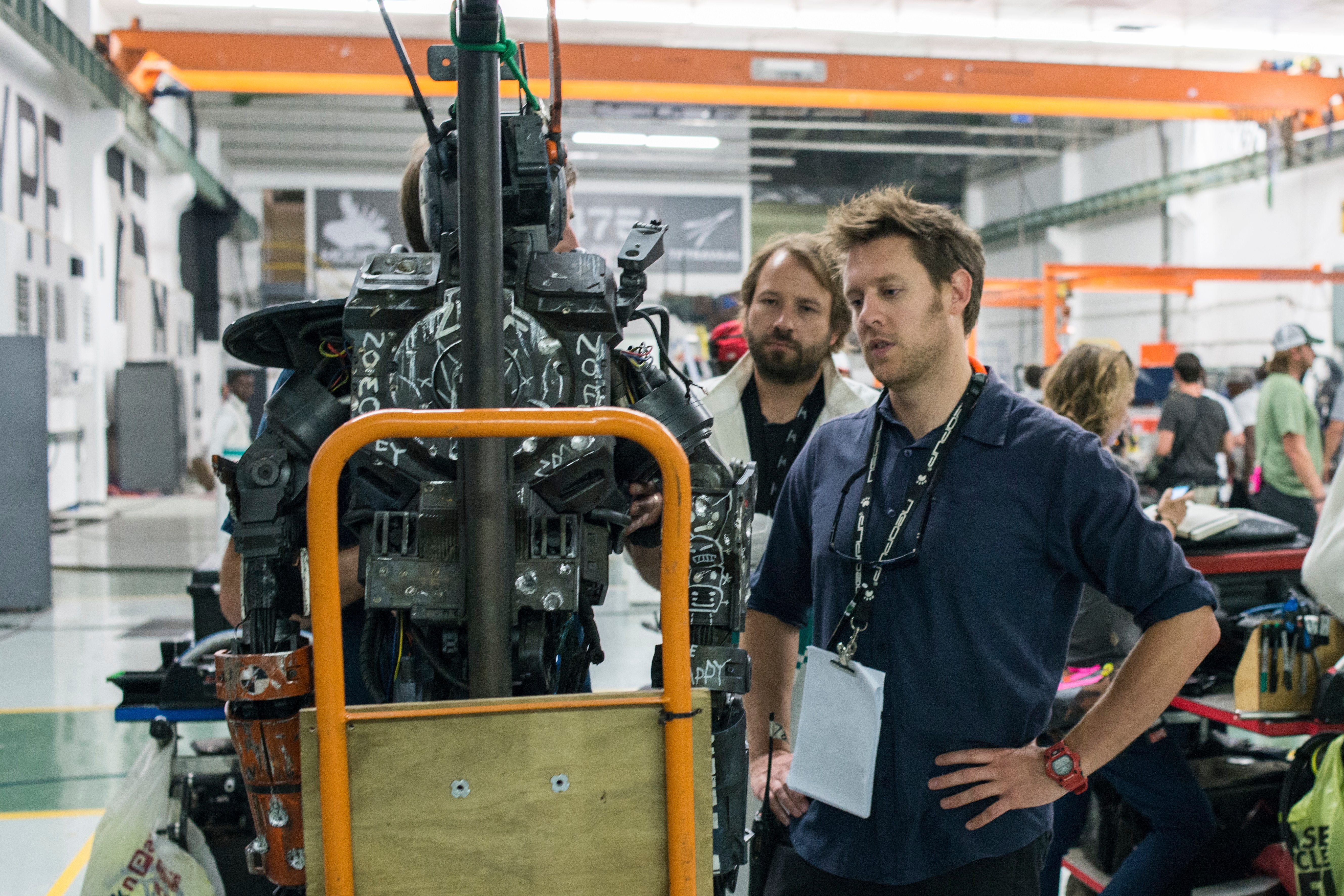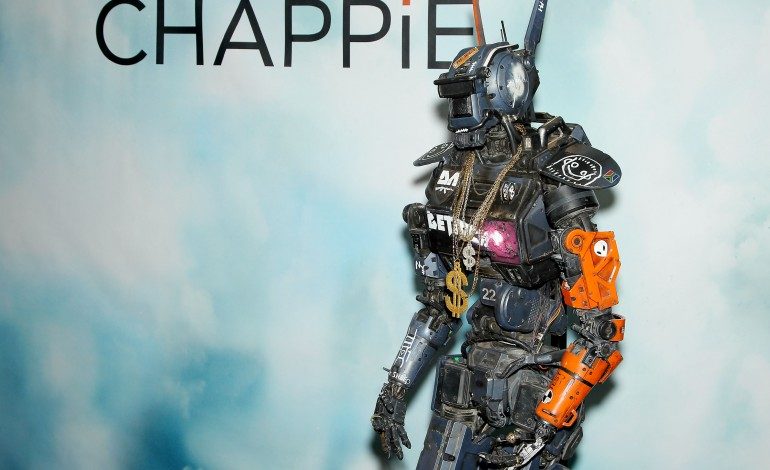

With every one of Neill Blomkamp’s movies, we get to see more and more who he really is. I don’t say this pejoratively; it’s true of any director. But with the way Blomkamp burst onto the scene with District 9 and was immediately anointed heir to the Orson Welles/James Cameron/George Lucas/Ridley Scott line of sci-fi succession, it feels like we’ve been course-correcting a little ever since. Elysium was a wreck, but it showed enough of what we all loved about Blomkamp to write it off as a learning experience and still be a little excited about his third feature, Chappie, which arrives in theaters today. I won’t call it a referendum on the direction Blomkamp’s career is heading, but after one good feature and one bad feature, it’s hard not to watch Chappie and look for evidence for the real Neill Blomkamp.
In truth, Chappie is a has some of both the good and the bad. This film seems to be Blomkamp’s best angels and worst demons furiously waging war while he and Chappie stand helpless in the middle. Blomkamp’s background is in visual effects – one of his early industry jobs was as an animator on Stargate SG-1 – and effects have always been my favorite parts of his movies. Better than maybe anyone else working today, Blomkamp knows how to erase the line between CGI and what’s actually on set. This is true not only of his eponymous robot’s interactivity with the rest of the cast (which is detailed, omnipresent, and stunning), but in a pure visual sense, where you look at the characters and even though you know intuitively that the robots must be CGI, by all appearances they’re made of the same stuff as everything else.
On the flipside, Blomkamp has always drawn flak about being too on-the-nose with his social commentary, and it seems he’s overcorrected this time out. Whereas Elysium was a two-hour fable about wealth inequality that was so intent on hammering the audience with its theme it had little time for characters or plot, Chappie is about so many different, and to its credit potentially interesting, thematic ideas that it doesn’t have enough time for its characters or plot, either. They’re better than Elysium overall (the characters and plot, that is), but there’s also no satisfaction of a well-explored thematic idea.
The plot, by the by, involves a couple engineers at a high tech design and manufacturing firm. Deon (Dev Patel) is the designer of the Scout robot, which has recently been employed as a prime component of the police force in Johannesburg, South Africa. The Scout has been so successful at decreasing both crime and police mortality that other projects, such as the Moose platform designed by Vincent Moore (Hugh Jackman) have had their funding steadily pulled. So Vincent isn’t happy, but the main thread is more about Deon trying to craft a true artificial intelligence, something he thinks he’s achieved but hasn’t been able to test when both he and a decommissioned Scout are abducted by a small gang of criminals trying to set up their final score before retirement. It’s a bit much to say how, but soon Chappie, the robot you’ve seen in all the promotional materials, is “born” and begins trying to navigate this new, exciting world flush with parents, a maker, and too many new things worth exploring.
Along the way, Chappie touches on the following themes, any one of which might have capably carried at least half the movie, and several of which that could have easily been woven together far better than actually are:
- The ethics of a police state
- Police brutality and the proper application of force to ensure a safe society
- The nature of society itself and man’s reaction to an ungoverned social order
- The nature of consciousness
- The nature of love and forgiveness
- Trust and the ethics of making promises and telling the truth vs. lying
- Nature vs. Nurture
- The purpose of life and the philosophy of a theoretical (or actual) creator
- The metaphysics of the afterlife
- The nature of the soul, especially as it pertains to art and identity
- Transhumanism
- The singularity (i.e. the rise of machine intelligence that may eclipse organic intelligence)
That is a lot to try to take on, but Blomkamp seems oddly agnostic towards each one of these issues. For example, the beginning of the movie summarizes the deployment of the robotic Scouts as a peacekeeping force and demonstrates their athletic capability, rapid response time, and ability to dispense deadly force, but at multiple points through the movie, Chappie’s gangster family is able to successfully flee the scene of a crime and escape to their hideout. Those are thematically incongruous narrative pieces, but Blomkamp never attempts to reconcile them, nevermind address the idea of why a well-armored robotic police force responsible for protecting human lives is using semiautomatic weapons to gun down criminals.
This leads me to a closely related issue, that of several massive and unanswered plot holes. There are plenty, but for a specific example: As we’re shown and told more than once, Vincent’s Moose platform, looking absurdly like RoboCop’s ED-209, which is telling, is capable of prosecuting a variety threats with extreme prejudice, but not once is the question asked why he and his company are marketing it to the police instead of the military. Surely Vincent and everyone else knows there’s not going to be much police demand for cluster bombs, right?
Part of this particular problem is that there just isn’t much to Vincent’s character, maybe best described as a disgruntled, mean ex-jock who, I guess, happens to be a very good engineer but is otherwise pretty stupid. There’s another scene where he very publicly threatens a coworker with a handgun, then plays it off as a joke because the gun wasn’t loaded. Setting aside why he wears the sidearm in the first place, my immediate thought was, “Well he’s fired,” but I seemed to be alone in that because no one ever brought it up again.
Deon is similarly shallow, but he at least we can get behind his motivation of a benevolent creator with the particular goal of creating an A.I., not to mention Dev Patel’s natural charisma. As for the rest of the cast, Sigourney Weaver is present as the CEO of the company that builds the Scouts, and Blomkamp muse Sharlto Copely is fine voicing Chappie. Probably the best performances of the film, though, belong to Chappie’s gangster “Daddy” and “Mommy,” played by Ninja and Yo-Landi Visser, better known in the real world as rappers Die Antwoord. Although the production occasionally misses the polish of a more established actor, there’s an efficiency and lack of pretension in the raw performances from both that’s refreshing and ironically fits well with their characters’ stable of affectations.
The Verdict: 2 of 5
Despite some sizeable plot holes and limited character development, there’s just enough here to keep Chappie a passably amusing watch. Still, with so much fertile ground left unplanted, it’s hard to look at Chappie as a success. It looks great, as all of director Neill Blomkamp’s films have, but for once it seems like he wasn’t sure what he had to say about the ideas illustrated by a movie of his. Chappie throws a lot at the screen, and there are moments of great potential all over if Blomkamp had chosen to focus on any one or two of them with the rest of the story. He doesn’t, and it dooms Chappie to an existence as a movie that feels remarkably unassured for a director’s third time to the big screen.

